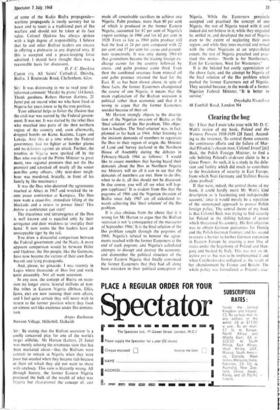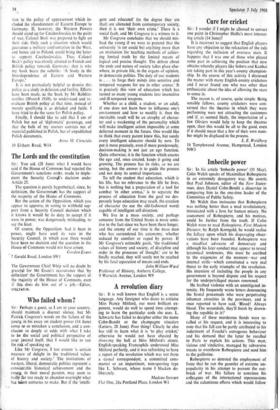Clearing the bog
Sir: I fear that I must take issue with Mr D. C. Watt's review of my book, Poland and the Western Powers 1938-1939 (28 June). Accord- ing to the reviewer, 'Its central theme concerns the continuous efforts and the failure of Mar- shal Pilsudski's chosen man, Colonel Joszef [sic] Beck, the Polish Foreign Minister, to find a role befitting Poland's ci-devant claim to be a Great Power. As such, it is a study in the delu- sion and futility which did much to contribute to the breakdown of security in East Europe, from which Nazi Germany and Stalinist Russia alone profited.'
If that were, indeed, the central theme of my book, it could hardly merit Mr Watt's kind description as 'a fascinating and indispensable account,' since it would merely be a repetition of the stereotyped approach to prewar Polish foreign policy. The central theme of my book is that Colonel Beck was trying to find security for Poland in the shifting balance of power which threatened his country. His first objective was to obtain German guarantees for Danzig and the Polish-German frontier, and his second to create a barrier to further German expansion in Eastern Europe by creating a new bloc of states under the hegemony of Poland and Hun- gary and backed by Italy. This was not an ob- jective per se, but was to be implemented if and when Czechoslovakia collapsed as the result of her abandonment by France and Britain. The whole policy was formulated as Poland's reac-
lion to the policy of appeasement which in- cluded the abandonment of Eastern Europe to Germany. If, however, the Western Powers should stand up for Czechoslovakia to the point of war, Colonel Beck was prepared to fight on their side. Only such a situation which would guarantee a military confrontation in the West, and hence aid to Poland, could bring the latter to support Czechoslovakia. Thus Colonel Beck's policy was closely attuned to French and British policy towards Germany; that is why my book bears the subtitle: 'A Study in the Interdependence of Eastern and Western Europe.'
It is not particularly helpful to dismiss this policy as a study in delusion and futility. Efforts have been made, as the book by Mr Robbins testifies (Munich 1938), to understand and re- evaluate British policy at that time, instead of merely qualifying it as deluded and futile. I have tried to do the same for Polish policy.
Finally, I should like to add that I am of Polish but not of `diplomatic' parentage, and that the bulk of my sources consists not of material published in Polish, but of unpublished Polish documents.











































 Previous page
Previous page